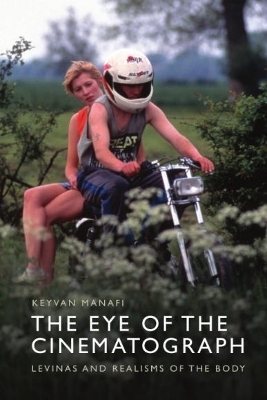
The Eye of the Cinematograph
L Vinas and Realisms of the Body
Seiten
2023
Edinburgh University Press (Verlag)
978-1-3995-0724-0 (ISBN)
Edinburgh University Press (Verlag)
978-1-3995-0724-0 (ISBN)
Explores the encounter between Emmanuel Levinas' ethical thought and aesthetic realisms of the body
Presents an interdisciplinary approach that brings together film studies, philosophies of ethics, cultural studies and critical theory to contribute to the fields of film-philosophy and cinematic thinking
Expands the existing enquiries into the consequences of Emmanuel Levinas' philosophy for aesthetics and draws out a new encounter between his ethical thought and film
Makes a case for the hospitality of the cinematic image by investigating its unique visual being as a gift and proposes an affirmative account of the ethics of the cinematograph through discussions of cinematic realism
The Eye of the Cinematograph investigates the ethical and aesthetic implications of the automatic formation of the body's image by the camera. Drawing on Emmanuel Levinas' thought, Manafi asks what happens when the other makes their body available to the gaze of the camera to be automatically recorded, and this giving of the body is preserved within the image, juxtaposed with other images to allude to a story that might otherwise remain untold.
To locate the ethical at this intersection of the body and the aesthetic, this book articulates an ethical account of a diverse range of film theories to demonstrate alternative encounters with the other that realisms of the body offer. Manafi discusses works by Chantal Akerman, Bruno Dumont, Pedro Costa, Gus Van Sant, Sohrab Shahid Saless, Abbas Kiarostami, Amir Naderi, Jafar Panahi, Carlos Reygadas and Andy Warhol to make a case for the ethics and aesthetics of incompleteness and performative failure.
Presents an interdisciplinary approach that brings together film studies, philosophies of ethics, cultural studies and critical theory to contribute to the fields of film-philosophy and cinematic thinking
Expands the existing enquiries into the consequences of Emmanuel Levinas' philosophy for aesthetics and draws out a new encounter between his ethical thought and film
Makes a case for the hospitality of the cinematic image by investigating its unique visual being as a gift and proposes an affirmative account of the ethics of the cinematograph through discussions of cinematic realism
The Eye of the Cinematograph investigates the ethical and aesthetic implications of the automatic formation of the body's image by the camera. Drawing on Emmanuel Levinas' thought, Manafi asks what happens when the other makes their body available to the gaze of the camera to be automatically recorded, and this giving of the body is preserved within the image, juxtaposed with other images to allude to a story that might otherwise remain untold.
To locate the ethical at this intersection of the body and the aesthetic, this book articulates an ethical account of a diverse range of film theories to demonstrate alternative encounters with the other that realisms of the body offer. Manafi discusses works by Chantal Akerman, Bruno Dumont, Pedro Costa, Gus Van Sant, Sohrab Shahid Saless, Abbas Kiarostami, Amir Naderi, Jafar Panahi, Carlos Reygadas and Andy Warhol to make a case for the ethics and aesthetics of incompleteness and performative failure.
Keyvan Manafi completed his PhD in film and philosophy at the University of New South Wales, Sydney, where he currently works as an Arts academic programs advisor.
| Erscheinungsdatum | 20.01.2023 |
|---|---|
| Zusatzinfo | 27 B/W illustrations 27 B&W images |
| Verlagsort | Edinburgh |
| Sprache | englisch |
| Themenwelt | Kunst / Musik / Theater ► Film / TV |
| Geisteswissenschaften ► Philosophie ► Ethik | |
| Sozialwissenschaften ► Kommunikation / Medien ► Medienwissenschaft | |
| ISBN-10 | 1-3995-0724-9 / 1399507249 |
| ISBN-13 | 978-1-3995-0724-0 / 9781399507240 |
| Zustand | Neuware |
| Informationen gemäß Produktsicherheitsverordnung (GPSR) | |
| Haben Sie eine Frage zum Produkt? |
Mehr entdecken
aus dem Bereich
aus dem Bereich


